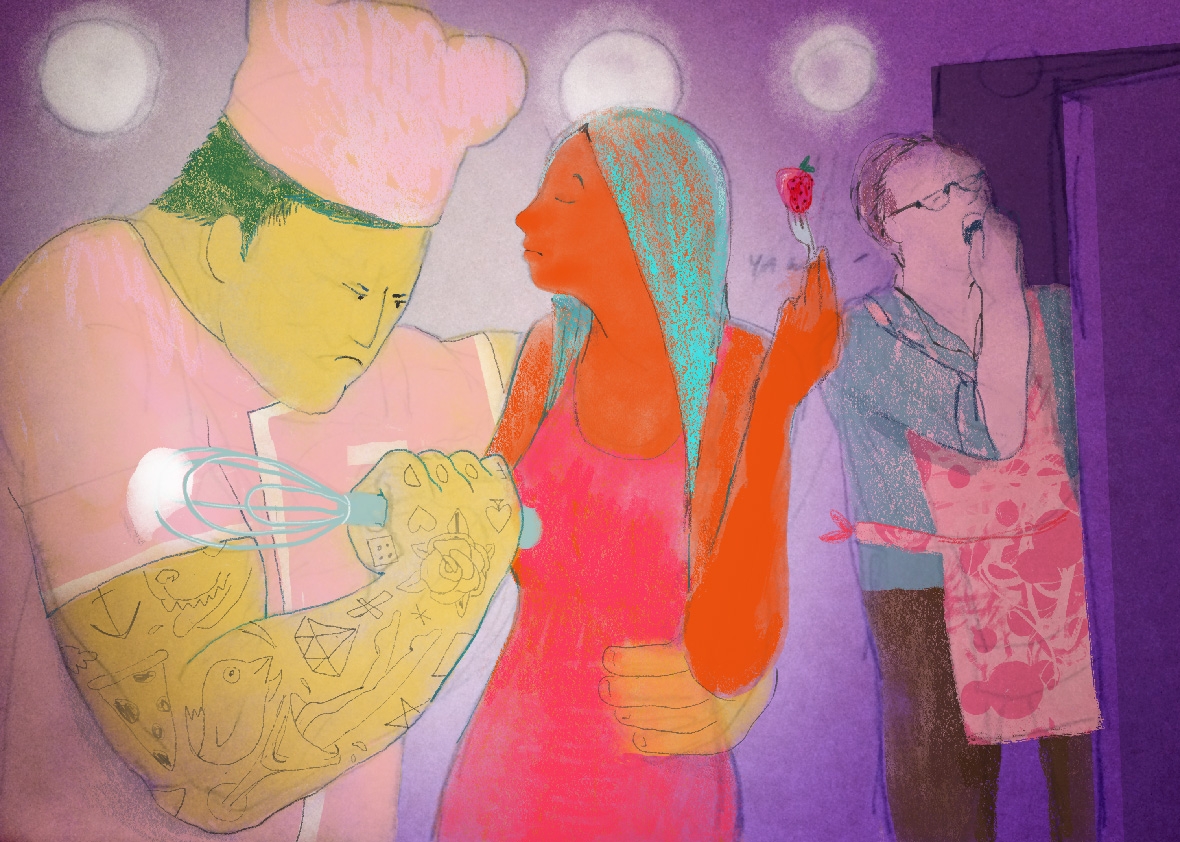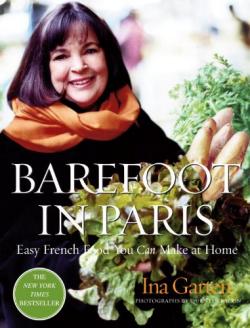The Joy of Gay Cooking: The Terrible Reign of the Iron Chef

Illustration by Lisa Larson-Walker.
Fifteen years ago, Anthony Bourdain’s memoir Kitchen Confidential popularized a new vision of the chef as badass mothafucka. The book exposed the restaurant kitchen as the home of a tightly woven fraternity of largely uneducated would-be-pirates, tattooed ex-cons, army veterans, drug addicts, and other buggers who work hard and party hard. To anyone who had spent some time in professional kitchens, this was not news. What was new was the fact that the mainstream public was suddenly showing interest in this formerly secluded niche, opening up a new world of possibilities for professional cooks who could suddenly hope for careers the likes of which had never before seemed possible in their métier.
|
The Child, the Bear,
the Queen, and the Artist |
||
|
The Straightening of American Cooking
|
||
|
The Terrible Reign of the Iron Chef
|
||
|
Cozy Lesbians and Colonialist Bros
|
||
|
The Art of Simplisissyty
|
As a result, a new class of ambitious misfits began to invade the culinary world, arriving with an unbridled hunger for fame, fortune, and vindication and an eagerness for the invigorating, adrenaline-fueled daily battle at the stove. Much of the food that came out of this development is what I like to call “dude food”—food that aggressively makes up with salt, grease, and hot spice (and media savvy) what it lacks in refinement. Cooking with spite and spice (not to mention modernist gadgets) might get the attention of some diners, but personally, I prefer food with flair to food with fire, which is still a rare find. And I could never warm up to the aggressive noise (and loud music) that always seemed to come with the fire food, sometimes blaring from the open kitchens (an equally new trend) into the dining room, where patrons are now routinely forced to shout at each other to be heard. As far as I’m concerned, if I can’t hear the food, I cannot taste it, either. Of course, the dude chefs don’t need this gay man’s validation. A new genre has been created for them, a literal arena in which they can boast their vigor, spurred on by a bloodthirsty national audience: The competition-style cooking show.
When the Food Network first imported the Japanese cooking show Iron Chef to fill airtime, no one could have predicted that its formula of fusing ritualized combat and food preparation would change this country’s perception of cooking. The show instantly gathered a cult following, prompting producers to create a series of American spin-offs. From there, it was only a small step to Food Network Star, Top Chef, Chopped, and their countless copycats. Their formula spiced things up by borrowing elements from other reality TV shows: a military-style tribunal, emotionally charged confessions, heated sparring among contestants, and the icing on the cake—food porn and Bond-girl-style hostesses in tight dresses and high heels who sulked alluringly as they nibbled their way through one culinary masterpiece (or train wreck) after another. In short, little was left to the imagination. Obviously, these shows were aimed at an audience of sport-loving straight dudes who like their foods rich and their girls hungry.
There is plenty of drive, despair, and elation in these battle royale cooking shows (and some truly astonishing talent), but they suffer from a conspicuous absence of irony (or, heaven forbid, wit), and contain not a hint of a rebellious spirit, no matter how much the contestants (straight or gay, bully or victim) like to brag about their outsider status. Never before had the deadly serious, reckless will to succeed in an increasingly competitive world been so baldly exposed—and America could not get enough of it. I sometimes entertain the thought of what would happen if just one contestant quipped, “Girrrrl, no!” at the judges instead of the mandatory “Yes, Chef!” What wouldn’t I give to see these eagerly competing chefs do something really different for once: Padma, ask them to take a cue from RuPaul and sissy that wok, for heaven’s sake!
The increasingly competitive climate of the contemporary American food world, heated to a hard boil by food TV, is a far cry from the atmosphere the gay or gay-adjacent pioneers of American cookery had tried to create. Theirs had been a mission of discovery, not of conquest. They had tried to teach America that preparing and serving food was a joyful means to celebrate life, here and now, unbound by tradition or what is considered “natural,” and free to break culinary rules and traditions for their own delectation. For that is precisely what self-defining gay men have always done instinctively—in bed, in life, and in the kitchen. This joy of gay cooking may still be a foreign concept to most people, and it may require special circumstances to come into full bloom, but when fully unleashed, everyone involved benefits from it. I should know, I am a living example.
* * *
In the summer of 1997, I accepted an offer to work in a luxurious mansion in the Hamptons, shared by a group of gay executive types who frolicked the weekends away, basking in their newly acquired wealth. When the leader of the pack interviewed me for the job, he explained that I would be in charge of buying and serving prepared foods from a local fine foods store. This did not interest me in the least, and I spontaneously offered to do all the cooking myself. It was a fairly bold proposition that changed my life. If he had planned to cast me as a cute gay butler who was eager to please, I made sure the scenario would not play out that way. Taking full charge of the kitchen with the passion of the artist and the flair of the performer I happen to be in my other life, I became the heart of the perfectly decorated but soulless mansion, infusing it with a sense of real joy that could not be bought from a catalog.

Amazon.com
The fine foods store the men had imagined I would get their lunches and dinners from turned out to be Ina Garten’s Barefoot Contessa, a nifty copycat of the once legendary gourmet take-out shop The Store in Amagansett, one of the first of its kind in the nation, dreamed up in 1966 by a flamboyant gay couple—playwright Bert Greene and theatre director Denis Vaugham—and their friends. The Store’s true legacy can be found in their jointly written cookbook: a treasure chest full of charming stories, erudite instructions (“The correct sound of a wire whisk beating cream should remind you of Gene Krupa brushing his cymbals through some vintage Benny Goodman”), and a fair sprinkling of snappy remarks about the Hamptons elite (“These poor hostesses, who are in constant competition with each other, remain in a state of twenty-four hour panic because they don’t know how to do anything—or are too indolent to even try”). How times have changed. Where do you find such writing in the inflated food world today, where everyone plays it safe, earnest, and cute—including Miss Garten, who advises her readers that “apples always taste better when you pick them yourself,” and describes how “at the store, lime tarts are made with lime zest and freshly squeezed juice so you can taste the freshness of the fresh limes.”
Having sampled the overpriced fare of the Barefoot Contessa shop and been less than impressed, I reconfirmed my offer to be personally in charge of all meals served at the house. After a few negotiations, I swiftly set out to make the mansion’s state-of-the-art kitchen my playground for the summer. Initially, there were a few meek attempts on the men’s part to try to control me by asking me to recreate a dish from some trendy restaurant or prepare a recipe from Gourmet magazine that piqued their fancy. This always elicited a wink and a knowing smile from me: “I can do better!” And I did. Eventually, they stayed out of my way and gave me full free rein: An unlimited budget for groceries and complete creative freedom. They never regretted it.
Soon, I was running the kitchen like a tight ship. Indeed, I came to call the mansion “the cruise ship”—not because there was necessarily a lot of cruising going on (if there was, I was way too busy to notice it), but because eating is pretty much the only thing passengers do on cruise ships, and that’s what it often felt like during those long, hot East Hampton weekends. Each day was filled with a never-ending string of meals—breakfast, brunch, lunch, afternoon snacks, teatime cookies, pre-dinner hors d’oeuvres, and three-course dinners. I made a point of concocting a completely different menu every single time, never doing any repeats, and of making everything from scratch—not because this had been imposed on me, but because I chose to work this way on my own behalf. In a way, I treated my job like an improvised performance. But unlike the poor contestants of cooking shows who must operate within a system of terror and follow orders to please their judges, I was dancing in circles around my clients, quick as lightning and always ahead of them, thinking of the next meal while they were still marveling at the one I had served them. It was a mad and flamboyant daredevil act, and I gleefully managed to pull it off every time, flaunting it, snap snap, with lots of attitude. I was having a ball.
At times, I had more than 20 hungry mouths to feed as more and more people casually stopped by “for a visit” at meal times, gravitating towards the kitchen like cats slinking towards a bowl of milk. But I turned it all into play, basking in my territory and gaily experimenting, cooking everything I had ever dreamed of cooking but never had had a chance to.
It was both exalting and exhausting. As the saying goes, it broke me in real good. In fact, it nearly broke my back as I kept bending over backward (but never bending over) to continuously exceed all expectations. The success of my first season as an in-house chef became the foundation of my career as a private chef. Admittedly, I was in an incredibly privileged position that could arguably never be replicated in a restaurant, much less in home kitchens of average means. But in fact, the true privilege of this experience was not the unlimited budget for groceries or the state-of-the-art kitchen I got to cook in, but the way it refashioned my relationship not just to cooking but to life in general. It taught me that there is nothing more glorious than to be completely in the moment, free to transform it at my own gay whim and make it not just better, but more personal—no matter how challenging the circumstances.
Next course: What lesbian chefs can teach us about identity-based cooking.
